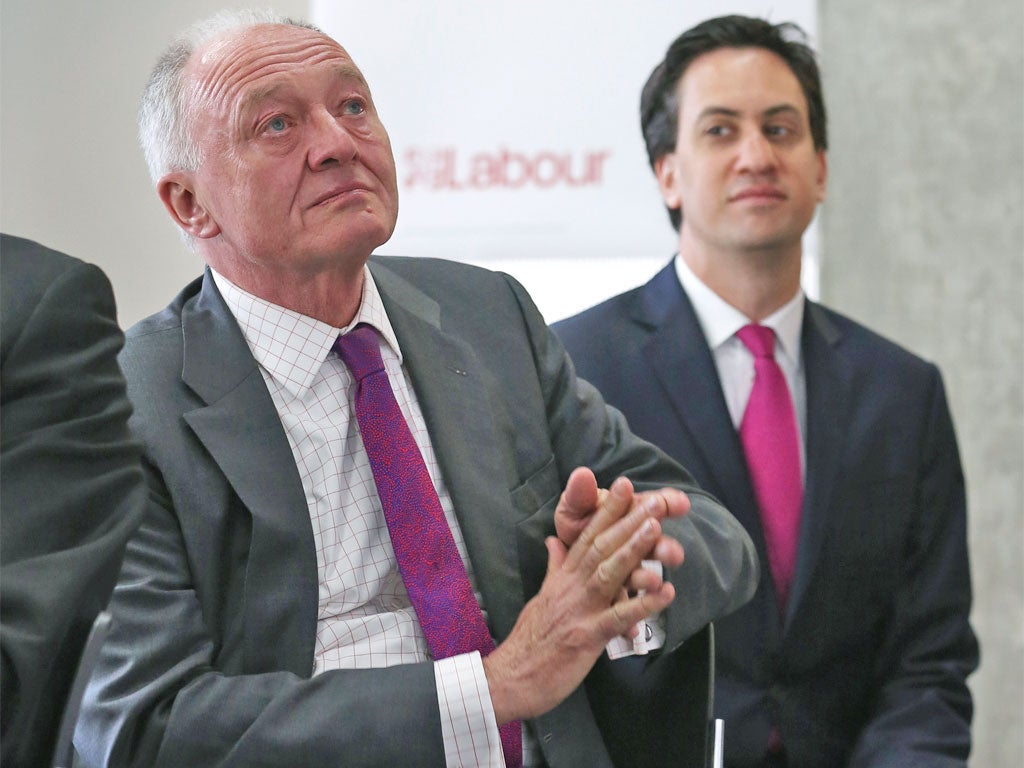Tears in his eyes – but will Ken the 'underdog' have last laugh?
Andy McSmith sees Livingstone, the London Mayor's main rival, launch his campaign

Tears sprang to Ken Livingstone's eyes yesterday as he watched the election broadcast his team put together to support his campaign to get back his old job as Mayor of London.
His show of emotion – which invoked a comforting pat on the shoulder from the Labour leader, Ed Miliband – was a sign of how much the result means to him – and possibly also a nagging fear that it is slipping from his grasp.
Opinion polls earlier this year put him neck and neck with the Tory incumbent, Boris Johnson, as Londoners reeled from the impact of an inflation-busting rise in the cost of bus and Tube fares.
But the most recent polls show Mr Johnson recovering his old lead, as attention focused on Mr Livingstone's tax affairs. At a hustings meeting in central London last night, the former mayor was booed and answered with shouts of "hypocrite" and "champagne socialist" as he struggled to explain why he channelled his earnings through a private company, avoiding income tax.
The Liberal Democrat contender, Brian Paddick, pointed out that arrangements such as Mr Livingstone's were lawful, but added: "Why should we be complaining? The answer is because Ken Livingstone condemned other people for doing exactly the same thing."
A better moment for Mr Livingstone – and a worse one for Boris Johnson – was when the candidates answered questions about the summer riots.
Mr Livingstone launched a scathing attack on the current Mayor for continuing on his US holiday as the riots escalated.
"I couldn't believe it that the days went by and we didn't hear from Boris. If you love this city, you want to be here when things are going wrong," he said, to loud applause.
The launch of Labour's London manifesto, in Greenwich, earlier in the day, drew a smaller crowd than Boris Johnson's campaign launch on Tuesday. And while Mr Johnson's election broadcast was about him and his nine-point plan for London, Mr Livingstone had only a walk-on part in the Labour broadcast, which featured a range of Londoners saying why they wanted him to win.
Mr Livingstone said afterwards: "I did find it very moving. It's an awesome responsibility to make sure we win because we can deliver so much for Londoners."
Mr Miliband added that his candidate has "always been the underdog" in the mayoral campaign.
The main promise in the manifesto that Mr Livingstone launched yesterday was a 7 per cent cut in fares on London's public-transport system, which he claims can be financed from Transport for London's cash surplus.
He has also promised to reinstate a £30-a-week Educational Maintenance Allowance to help children from low-income families to stay in education.
In a document headed "Can't Afford Ken", Boris Johnson's campaign team claimed to have counted 24 promises in Mr Livingstone's manifesto, which they reckoned would cost a minimum of £2.7bn. But Labour hit back yesterday evening with its own document accusing the Tories of a "catalogue of mistakes".
Opponents say support will be dismally low. In January, Salford voted to have a mayor on a turnout of 18.1 per cent, with 17,344 voting Yes. The front-runner is the former Labour MP for Eccles, Ian Stewart, who beat Salford council leader John Merry to the nomination in the party stronghold. But Guy Lodge, of the Institute for Public Policy Research, believes low levels of voter engagement should not overshadow the benefits of city mayors. "Once in place they would change the nature of the democratic contest. They would provoke interest in local politics in a way that traditional local authority elections have failed to do," he said.
Liverpool City Council opted not to offer a referendum but to move straight to the mayoral vote. Labour council leader Joe Anderson is favourite to win. In Doncaster, by contrast, voters will be asked if they would prefer to ditch the mayoral experiment, potentially unseating the controversial incumbent, English Democrat Peter Davies, who has been in office since 2009.
Elsewhere there are those who doubt the claim that power will flow downwards. Bill Martin, a former Lord Mayor of Bristol, is leading the No vote campaign there. "What is an elected mayor going to achieve? What are they going to deliver for us? We are told there will be no extra powers and no extra resources. It is a con," he said.
Jonathan Brown
Subscribe to Independent Premium to bookmark this article
Want to bookmark your favourite articles and stories to read or reference later? Start your Independent Premium subscription today.

Join our commenting forum
Join thought-provoking conversations, follow other Independent readers and see their replies